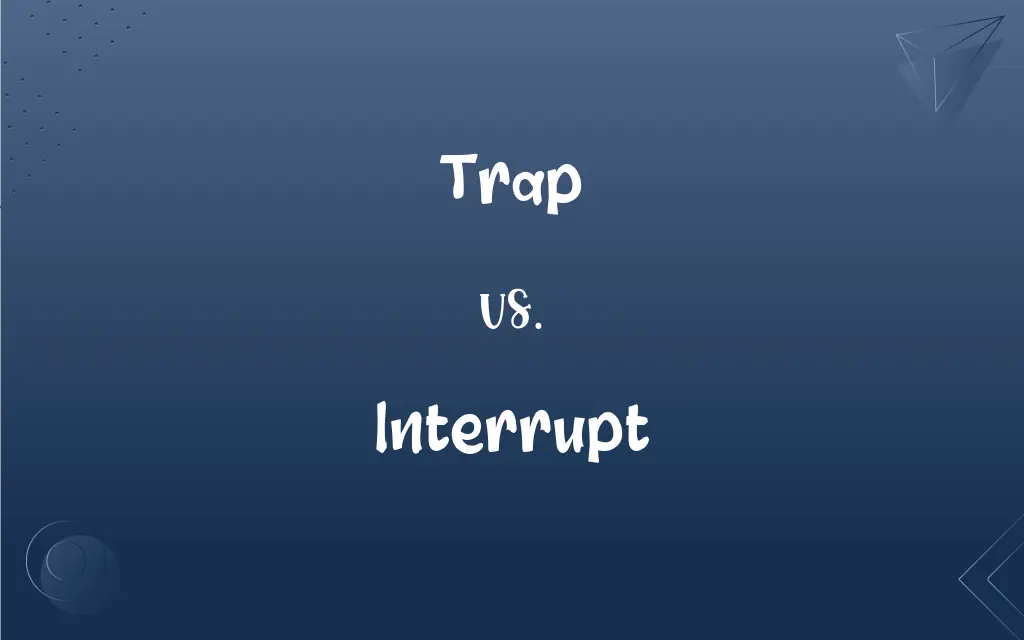Trap vs. Interrupt: What's the Difference?
Edited by Aimie Carlson || By Janet White || Published on November 30, 2023
A trap is a software-generated interrupt triggered by an error or specific condition in a program, while an interrupt is a hardware or software signal that pauses CPU operations to handle an event.

Key Differences
A trap, in computer terms, is a type of interrupt specifically initiated by software, typically to signal an error or request a service from the operating system. An interrupt, however, can be either hardware or software-based, serving as a signal that temporarily halts CPU operations to address an event or execute a higher-priority task.
Traps are often used to handle exceptions in software, such as illegal operations or division by zero. Interrupts, on the other hand, can be triggered by external devices (like a mouse click) or internal conditions (like a timer expiring), indicating a need for immediate attention by the CPU.
A trap is a mechanism for the operating system to take control and perform specific operations, like managing a system call from a program. Interrupts serve a broader purpose, managing the interactions between the CPU and external or internal events, ensuring efficient processing and response.
Traps are crucial in debugging, as they can signal problems within a program's operation, allowing for corrective measures. Interrupts, conversely, are essential for multitasking and real-time processing, allowing the CPU to respond quickly to various events without continuous polling.
The handling of a trap usually involves executing a predefined routine to manage the specific issue or request. Interrupt handling involves the CPU pausing its current task, saving its state, processing the interrupt, and then resuming the original task.
ADVERTISEMENT
Comparison Chart
Origin
Initiated by software
Can be triggered by both hardware and software
Purpose
Handle exceptions or system calls
Manage and respond to external or internal events
Function in Systems
Used for error signaling and service requests
Essential for multitasking and real-time processing
Handling
Executes specific routines for issues or requests
Involves pausing and resuming CPU tasks to address the event
Use in Debugging
Important for identifying program errors
Less about debugging, more for efficient system operation
ADVERTISEMENT
Trap and Interrupt Definitions
Trap
A mechanism for the operating system to take control from a program.
A trap was used to handle the illegal operation executed by the software.
Interrupt
A system for managing CPU response to hardware signals.
The external hard drive's connection initiated an interrupt to the main processor.
Trap
A signal for specific issues within a program's execution.
The program hit a trap when it tried to access restricted memory.
Interrupt
A signal that pauses CPU operations to handle external or internal events.
A hardware interrupt was triggered when the user pressed a key.
Trap
A software interrupt for managing system calls.
The system call to access the file system was managed by a trap.
Interrupt
A mechanism for responding to device requests or system events.
The timer's expiration caused a software interrupt to notify the CPU.
Trap
A software-generated interrupt for error signaling or service requests.
The trap was triggered when the program attempted to divide by zero.
Interrupt
A method for real-time processing in computers.
The sensor data interruption ensured timely processing by the system.
Trap
An exception handling tool in software.
The trap identified the overflow error during the computation process.
Interrupt
A tool for efficient CPU multitasking and event handling.
The interrupt allowed the CPU to temporarily stop its current task and process the incoming data.
Trap
A confining or undesirable circumstance from which escape or relief is difficult:fell into poverty's trap.
Interrupt
To stop (someone engaged in an activity) by saying or doing something
The baby interrupted me while I was on the phone.
Trap
A contrivance for catching and holding animals, as a concealed pit or a clamplike device that springs shut suddenly.
Interrupt
To cause an activity to stop by saying or doing something.
Trap
A stratagem for catching or tricking an unwary person.
Interrupt
To break the continuity or uniformity of
Rain interrupted our baseball game.
FAQs
Are there figurative uses of 'trap'?
Yes, "trap" can be used figuratively to mean being in a situation that is hard to escape from.
What is an example of 'trap' in a sentence?
"She set a mouse trap in the kitchen."
Is 'trap' used in specific fields or contexts?
"Trap" is often used in contexts like hunting, sports, and mechanics.
Can 'trap' be used as a verb?
Yes, "trap" can be a verb, meaning to catch or ensnare someone or something.
What does 'trap' mean?
"Trap" generally refers to a device or enclosure designed to catch and retain animals or objects, typically by surprise and often for hunting or pest control.
Are there idioms that include 'trap'?
Yes, like "fall into a trap" or "lay a trap."
Can 'interrupt' be used as a noun?
Less commonly, but yes, as in "an interruption."
What is an example of 'interrupt' in a sentence?
"The phone call interrupted his concentration."
What are synonyms for 'trap'?
Synonyms include snare, capture, ensnare.
What is the origin of 'trap'?
It comes from Old English "træppe" or "treppan," meaning to step, tread.
How is 'trap' used in technology?
In computing, a trap can refer to an unexpected event needing special processing.
Can 'interrupt' have a positive connotation?
It can, especially if the interruption prevents something negative.
Can 'trap' have a negative connotation?
Yes, especially when used to describe deceptive or confining situations.
Are there different types of interruptions?
Yes, interruptions can be physical, verbal, or technological.
Is 'interrupt' used in specific fields?
Yes, particularly in computing and electronics, where it refers to a signal that temporarily stops a process.
What does 'interrupt' mean?
"Interrupt" means to stop the continuous progress of an activity or process.
What are synonyms for 'interrupt'?
Synonyms include halt, disrupt, interfere.
What is the origin of 'interrupt'?
It comes from the Latin "interruptus," meaning break, divide.
Are there idioms that include 'interrupt'?
Yes, like "don’t interrupt the speaker."
How is 'interrupt' used in technology?
In computing, an interrupt is a signal that causes a computer to temporarily halt its current operations.
About Author
Written by
Janet WhiteJanet White has been an esteemed writer and blogger for Difference Wiki. Holding a Master's degree in Science and Medical Journalism from the prestigious Boston University, she has consistently demonstrated her expertise and passion for her field. When she's not immersed in her work, Janet relishes her time exercising, delving into a good book, and cherishing moments with friends and family.
Edited by
Aimie CarlsonAimie Carlson, holding a master's degree in English literature, is a fervent English language enthusiast. She lends her writing talents to Difference Wiki, a prominent website that specializes in comparisons, offering readers insightful analyses that both captivate and inform.






































































